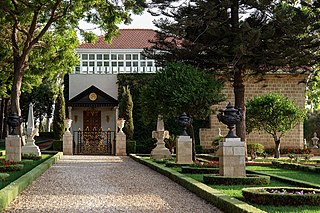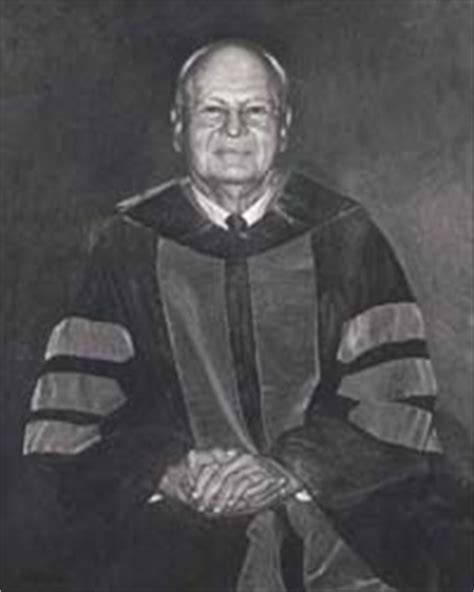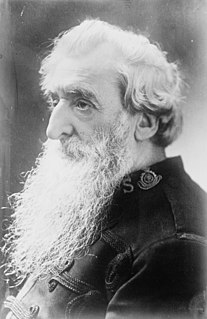A Quote by Baha'u'llah
... The decrees of the Sovereign Ordainer, as related to fate and predestination, are of two kinds. Both are to be obeyed and accepted. The one is irrevocable, the other is, as termed by men, impending. To the former all must unreservedly submit, inasmuch as it is fixed and settled. God however, is able to alter or repeal it. As the harm that must result from such a change will be greater than if the decree had remained unaltered, all, therefore, should willingly acquiesce in what God hath willed and confidently abide by the same.
Related Quotes
He that is once "born of God shall overcome the world," and the prince of this world too, by the power of God in him. Holiness is no solitary, neglected thing; it hath stronger confederacies, greater alliances, than sin and wickedness. It is in league with God and the universe; the whole creation smiles upon it; there is something of God in it, and therefore it must needs be a victorious and triumphant thing.
We must conclude that, being necessary to God by a necessity which is called "hypothetical", (that is, because God so willed it), the Blessed Virgin is all the more necessary for men to attain their final end. Consequently we must not place devotion to her on the same level as devotion to the other saints as if it were merely something optional.
All men cannot go to college, but some men must; every isolated group or nation must have its yeast, must have, for the talented few, centers of training where men are not so mystified and befuddled by the hard and necessary toil of earning a living as to have no aims higher than their bellies and no God greater than Gold.
All men cannot go to college but some men must; every isolated group or nation must have its yeast, must have for the talented few centers of training where men are not so mystified and befuddled by the hard and necessary toil of earning a living, as to have no aims higher than their bellies, and no God greater than Gold.
The God who inspired the Bible is the same God who made the universe, Earth, and all life. This God is the very definition of truth; therefore nature's record will never contradict Scripture and vice versa. When a seeming contradiction confronts us, we can know with certainty we have either misunderstood (one, the other, or both revelations) or perhaps we haven't yet dug deploy enough. Whatever the case, we can embrace the opportunity to gain greater knowledge and appreciation for the Bible, for nature, and for the God who is responsible for both.
To be right, a person must do one of two things: either he must learn to have God in his work and hold fast to him there, or he must give up his work altogether. Since, however, we cannot live without activities that are both human and various, we must learn to keep God I everything we do, and whatever the job or place, keep on with him, letting nothing stand in our way.
God's wrath is not an implacable, blind rage. However emotional it may be, it is an entirely reasonable and willed response to offenses against his holiness. But his love . . . wells up amidst his perfections and is not generated by the loveliness of the loved. Thus there is nothing intrinsically impossible about wrath and love being directed toward the same individual or people at the same time. God in his perfections must be wrathful against his rebel image-bearers, for they have offended him; God in his perfections must be loving toward his rebel image-bearers, for he is that kind of God
So saving grace, converting grace, for Augustine, is God's giving us a sovereign joy in God that triumphs over all other joys and therefore sways the will. The will is free to move toward whatever it delights in most fully, but it is not within the power of our will to determine what that sovereign joy will be.
Both read the same Bible, and pray to the same God; and each invokes His aid against the other. It may seem strange that any men should dare to ask a just God's assistance in wringing their bread from the sweat of other men's faces; but let us judge not that we be not judged. The prayers of both could not be answered; that of neither has been answered fully.
I will tell you the secret: God has had all that there was of me. There have been men with greater brains than I, even with greater opportunities, but from the day I got the poor of London on my heart and caught a vision of what Jesus Christ could do with me and them, on that day I made up my mind that God should have all of William Booth there was. And if there is anything of power in the Salvation Army, it is because God has had all the adoration of my heart, all the power of my will, and all the influence of my life.
Happiness and the absurd are two sons of the same earth. They are inseparable. It would be a mistake to say that happiness necessarily springs from the absurd discovery. It happens as well that the felling of the absurd springs from happiness. "I conclude that all is well," says Oedipus, and that remark is sacred. It echoes in the wild and limited universe of man. It teaches that all is not, has not been, exhausted. It drives out of this world a god who had come into it with dissatisfaction and a preference for futile suffering. It makes of fate a human matter, which must be settled among men.



































